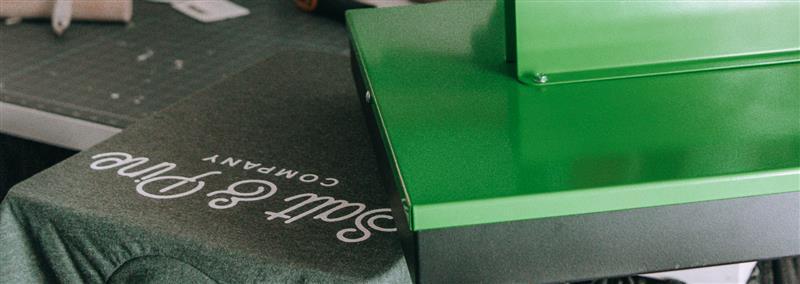Getting into screen printing is expensive. Many printers start off with a heat gun as a curing device. It’s cheap, and it does the job. Once the orders start piling up, heat guns don’t cut it anymore. They slow down the process and aren’t consistent. What should a printer upgrade to that doesn’t cost a lot? Consider a flash dryer. Amanda Dunigan, owner of Salt & Pine Co., added a flash dryer to her shop and shares how it has impacted her production.

Photo by Amanda Dunigan
UPGRADES ALL DAY
Amanda has been operating her one-woman show for two years. She started with heat transfer vinyl (HTV). When the orders started stacking up, she switched to screen printing. This sped up her production and improved the quality of her products. She was able to advance her business.
But her process still needed some fine-tuning. Amanda had been using a heat gun to cure her prints. This worked fine, but it could have been better. Amanda got her hands on a flash dryer, which quickened production since it heats over the entire print at once and has a more reliable heat source.
“The consistent heat and ease of use was a no-brainer when discussing investments for my in-home shop,” Amanda said.
RELATED: MEET THE MAKER OF SALT & PINE CO.
IS A FLASH DRYER WORTH IT?
What started as a side-hustle turned into a full-time gig, and now she’s constantly pushing products out the door and around the U.S. A flash dryer has helped her cut down production time and up her efficiency. But is it worth it for DIY printers?
She has one question: How DIY are you?
If your screen printing gig is simply a hobby, investing in a flash dryer might not be necessary. A heat gun will still get the job done.
“If you plan to make this your full time gig then I would 100% invest in the upgrade for your process,” Amanda said.
Most flash dryers use coil elements like you would see in an oven. Consistent heat radiation over the entire element surface ensures every print is properly flashed or cured.
RELATED: CURING WITH A FLASH: PLASTISOL INK EDITION

Photo by Amanda Dunigan
LEARNING THE TRADE
Any upgrade requires a learning curve. For Amanda, adding a flash dryer to her small space was tricky.
“It was like putting an open oven in my office, which terrified me!” Amanda said.
Since flash dryers provide a more consistent heat source, flash times are shorter. Once Amanda perfected this, she moved at top-speed. She could set the heat gun aside.
“Now it is just second nature!” She said.
Space was also an issue in adding a flash dryer to her setup. Amanda works out of a spare bedroom in her house, and doesn’t have much room to spare.
CHECK OUT AMANDA’S EQUIPMENT
“Because of the dynamic of the flash drying being a ‘hover,’ the feet are incredibly large and take up a significant amount of space,” Amanda said.
She’s since learned to make it work, but maneuvering the flash around her shop to find the perfect spot took a little trial and error.

Amanda's flash unit is perfectly aligned to maximize space.
Amanda has two pieces of advice for printers who are new to using a flash. The first is to not be afraid of adding an open heat source to your shop. It might seem daunting, but take it from Amanda: pretty soon it’ll be second nature.
Her second piece of advice is to keep the temperature down.
“Open a window because it gets dang hot in the room!” Amanda said.
Whether you’re just starting your side hustle or feeling overwhelmed with orders, investing in equipment that improves the quality of the product matters. Not only did a flash dryer accelerate Amanda’s production, it cured garments better than the heat gun. Her customers have benefited greatly from the upgrade.

